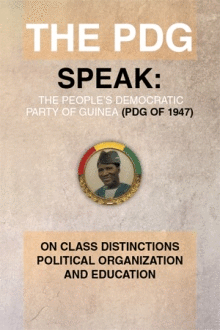Interestingly, the white left has consistently and continuously ignored Ahmed Sekou Ture in their efforts. Its important that we explore the reasons why. Its imperative for their objectives to leave out not only Ture, but the Democratic Party of Guinea (PDG) - the Pan-Africanist political party founded by Ture, because the PDG and Ture, with their clear focus on African self-determination, makes it much more difficult for these alien forces to re-shape what these Africans represented. The PDG unquestionably was and is a party dedicated to African freedom and independence. A party that resolutely believes in the Revolutionary African Personality and one unified socialist Africa. That's why most of what you will see written about Ture and the PDG will either superficially paint Ture as a Marxist or just dismiss him as a dictator.
A major factor in shaping Guinea's legacy is the bold method in which Guinea refused to continue as a part of the French Union in 1958. This mass action cemented Guinea as a country dedicated to African nationalism. And Guinea's continued refusal to bow down to the whims of the West during the 60s and 70s, further reaffirmed the inability to position them as darlings of the white left movement. Guinea made it clear since their 1958 independence that they would not side with the Western capitalist countries or the Soviet led Eastern block countries. That their allegiance was solely to African independence. They doubled down on this position with their refusal to accept Western aide and how they negotiated their relationships with capitalist countries. Repeatedly, Guinea rebuked U.S. and Soviet efforts to dictate their relationships, preferring instead to build relationships with genuine revolutionary movements like Cuba.
On November 22, 1970, the Portuguese military invaded Guinea in an effort to overthrow the PDG and the Ture government. The reason this invasion happened was because of Guinea's firm support for the African Party for the Independence of Guinea-Bissau (PAIGC), the Pan-Africanist party founded by Cabral to overthrow Portuguese colonialism. The PDG and Guinea offered the PAIGC a base in Guinea and full use of all of Guinea's military bases and resources. The PDG permitted the Cubans to come to Guinea to help train PAIGC fighters. Every thing the PAIGC needed to secure its ability to prepare its fight against colonialism, Guinea and the PDG provided to them. As a result, Portugal invaded Guinea and the people of Guinea responded by providing Portugal with a resounding defeat that they never actually recovered from.
Although the PAIGC was certainly a major reason for the invasion, they may not have been the only reason. Another imperialist concern was the presence of Kwame Nkrumah in Guinea. Four years before, the U.S. Central Intelligence Agency helped engineer an illegal coup fueled by misinformation to overthrow the democratically elected government of Kwame Nkrumah in Ghana. As soon as this unfortunate incident occurred, Ture and the PDG made arrangements for Nkrumah to seek refuge in Guinea. Ture immediately honored Nkrumah by naming him president of Guinea. In other words, Ture was willing to give up his position as president, hardly the actions of a dictator, to thumb his nose at imperialism. Nkrumah responded by indicating the people of Guinea elected Sekou Ture as president. Ture's response to that was to name Nkrumah as co-president and to implore Nkrumah to continue to develop the strategy for the African revolution. Nkrumah accepted this role and produced two of his most important works during his final years in Guinea e.g. the "Handbook of Revolutionary Warfare" and "Class Struggle in Africa." Why would it be inconceivable for Portugal, by wanting to eliminate the Ture government, would also provide a service for all of imperialism by eliminating Nkrumah as well? Its a fact that the Portuguese air-force immediately bombed Vila Syli, the Conakry-Guinea home of Kwame Nkrumah, upon their invasion. This couldn't have been an accident. The PDG's embrace of Nkrumah, and then Stokely Carmichael (later Kwame Ture) - who moved to Guinea in 1969 after being the poster child of militant resistance in the U.S., along with its support for the PAIGC, as well as the liberation movements in Angola and Mozambique, had to be a major concern for all of imperialism.
Final thoughts suggest more discussion about the role and contributions of the PDG need to be explored. What we know is we more than likely could not have Nkrumah's final revolutionary works were it not for Ture and the PDG. We more than likely wouldn't have Cabral's outstanding contributions as well as those of the PAIGC and the other liberation movements. And, certainly, we could not have had an environment to nurture the continued political maturation and sophistication of Stokely Carmichaalel, later Kwame Ture, who went on to make major contributions to the current shape of the revolutionary Pan-African movement today. It is impossible to talk about Africa, Cabral, Nkrumah, Lumumba, Kwame Ture, the Black power movement in the U.S., and anything related to Pan-Africanism today without acknowledging and honoring the contributions of the PDG and Sekou Ture.


 RSS Feed
RSS Feed
